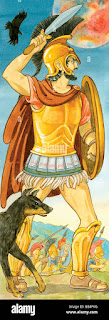The Golden Age (χρυσή εποχή ) (chrysí epokhí) means the best time of humanity. Perhaps it was so in the past or it will be so in the future.
These words come from Ancient Greece. In Greek mythology there are five ages of humanity (χρύσεον γένος) (chrýseon génos): Gold, Silver, Bronze, Heroic, and Iron.
Also, other myths and legends have their own Golden Age.
Writers wrote books about it, and artists drew images.
Sometimes the Golden Age is called the dawn of civilization.
This is actually a utopia.





































